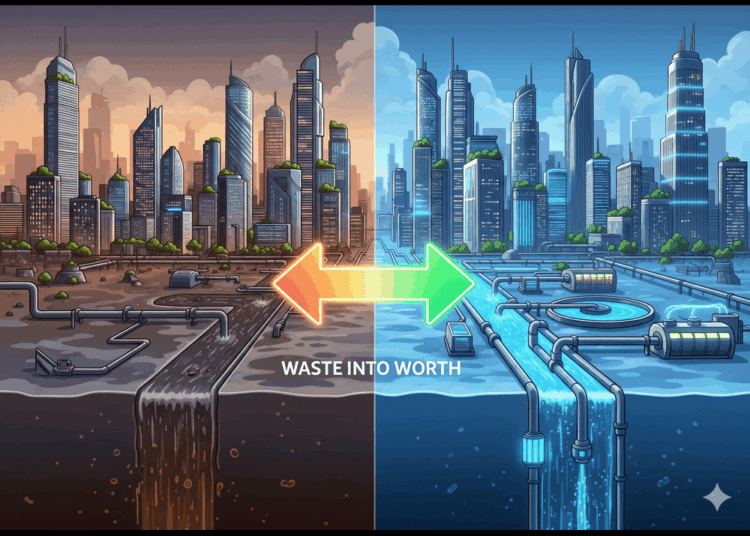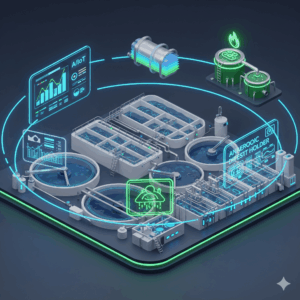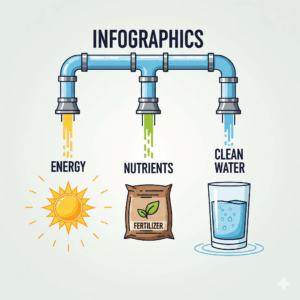Wastewater Management: From Byproduct to Resource
Water, though vital to life, has long been undervalued in global priorities. While attention often centers on potable water availability, wastewater management has historically remained in the shadows, dismissed as a mere byproduct. But the narrative is shifting.
With rising water scarcity worldwide, wastewater is now recognized not as waste, but as an underutilized resource with immense potential. Innovations in wastewater treatment are reshaping the way cities, industries, and communities approach water sustainability, turning challenges into opportunities for recovery, reuse, and regeneration.
More than an environmental obligation, wastewater management has become a strategic imperative. New technologies and circular economy models are leveraging wastewater to generate renewable energy, recover essential nutrients, and replenish shrinking freshwater reserves.
The Drivers Behind Wastewater Innovation
The transformation of the wastewater sector is driven by powerful global forces. Rapid urbanization, accelerating climate change, and expanding industrialization are putting immense pressure on conventional treatment systems. At the same time, governments and regulators are tightening compliance standards, forcing utilities and industries to adopt more resilient and efficient systems.
Linear, energy-intensive wastewater systems are gradually being replaced—or enhanced—by smarter, more sustainable technologies. Circular economy principles of reuse, regeneration, and resource retention are at the heart of this change. Wastewater is no longer a disposal problem but a flow of opportunities: a renewable source of clean water, energy, and valuable materials.
Technological Innovations in Wastewater Management
The heart of this transformation lies in technological innovation in wastewater management.
-
Membrane Processes: Reverse osmosis, ultrafiltration, and advanced filtration systems are enabling the reuse of treated wastewater in drinking water supplies, agriculture, and industries. These solutions deliver superior contaminant removal while supporting decentralized treatment systems, particularly critical in water-scarce regions.
-
Anaerobic Digestion: This process offers dual benefits—sludge treatment and biogas generation. By breaking down organic matter, anaerobic systems reduce emissions while producing renewable energy, making them increasingly popular in urban wastewater facilities and food processing operations.
-
AI and Smart Monitoring: Artificial intelligence is transforming treatment plants with real-time data analysis, predictive maintenance, and automated control. These digital tools optimize chemical usage, reduce energy costs, and boost operational efficiency while enhancing transparency across the water cycle.
Together, these innovations are making wastewater treatment more sustainable, efficient, and scalable than ever before.
Resource Recovery: Beyond Traditional Treatment
Modern wastewater facilities are no longer just treatment plants—they are becoming resource recovery hubs.
-
Nutrient Recovery: Essential nutrients like nitrogen and phosphorus are extracted and recycled into fertilizers for agriculture.
-
Material Recovery: Advanced processes allow recovery of rare metals and the conversion of organic matter into bio-based products or soil enhancers.
-
Energy Production: Biogas generated from sludge digestion is increasingly being used as an alternative fuel, reducing reliance on fossil energy.
This approach creates a win-win for the economy and the environment. By recycling valuable materials and generating new revenue streams, utilities and industries are not only meeting sustainability targets but also reducing landfill dependency.
Industrial Innovation and Collaboration
Industries are at the forefront of advancing wastewater solutions.
-
Closed-loop systems are being adopted in textiles, pharmaceuticals, manufacturing, and food & beverage sectors. These systems recycle and treat wastewater within business operations, significantly reducing freshwater demand while ensuring regulatory compliance.
-
Collaborative initiatives such as public-private partnerships, technology incubators, and global programs (like the UN’s Water Action Agenda) are accelerating scalable innovation.
Such collaborations are vital for developing cost-effective solutions and sharing knowledge across industries and regions.
Social and Environmental Impact of Wastewater Management
The benefits of wastewater innovation extend beyond technology and economics.
In low- and middle-income nations, inefficient wastewater treatment leads to widespread waterborne diseases, ecosystem degradation, and economic losses. Affordable decentralized treatment solutions are helping these regions improve public health, protect natural systems, and support local economies.
In urban centers facing population growth and dwindling freshwater resources, wastewater reuse is critical. Integrated water management approaches, combined with green infrastructure such as constructed wetlands and natural treatment systems, are being embedded into city planning for long-term resilience.
The Road Ahead: Policy, Awareness, and Investment
While technology drives innovation, the scaling of wastewater management solutions requires policy support, financial investment, and public acceptance.
-
Policy and Incentives: Governments must foster open regulatory frameworks that encourage reuse, recycling, and innovation in wastewater projects.
-
Investment: Green infrastructure financing must adapt to support both large-scale utilities and decentralized community-based systems.
-
Social Acceptance: Public trust is essential, particularly for potable reuse projects. Education and transparency are key to ensuring communities embrace treated wastewater as safe and valuable.
Conclusion: Wastewater as a Catalyst for Sustainability
The world is entering a new era of wastewater management—one defined not by disposal but by innovation, recovery, and resilience. No longer a burden, wastewater is becoming a vehicle for sustainable growth, offering solutions for water scarcity, renewable energy generation, and environmental justice.
By unlocking value from what was once discarded, societies are not just safeguarding water resources—they are building a more circular, sustainable future where waste truly turns into worth.
Explore more insights on sustainability and innovation in IMPAAKT, the top business magazine for future leaders.














